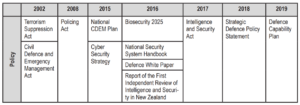Author: Rothery, C.
Published in National Security Journal, Volume 1, Issue 1, October 2019
necessary to widen the span of organisations involved in national security planning to include the private sector, as well as potentially the general public. The need for an increase in the private-public sector dialogue is articulated by Professor Rouben Azizian, who argued that businesses should be more vocal pre-crisis, rather than only becoming involved after an event has occurred.23 This view is also championed by Captain David Morgan in his recent address to Massey University’s National Security Conference in 2018, where he suggested that major companies, such as Air New Zealand and Fonterra, need to be actively involved in the national security dialogue.24 Given that the protection of the economy is one of the seven objectives of New Zealand’s national security, it would make sense to have a more inclusive environment for the private sector to be involved in the development of a security strategy.
For New Zealand’s national security framework to be effective it is necessary that the ideas of how the state will provide security to the population and what is required of them, is effectively communicated. However, the NSS Handbook is a little-known publication, with one prominent business leader commenting that he “didn’t know about it until [he] was asked for an interview”.25 Even the National CDEM Plan 2015 suffers from the same anonymity. Furthermore there is little public discussion in New Zealand on the subject, meaning that security is hardly in the consciousness of the population. Excepting key crises, the only time there has been significant public debate on security matters is when there is an outcry over additional funding for a security agency such as the NZDF26 or as a result of an agency conducting an unlawful operation.27 Although New Zealand has seen an increase in security concerns over the last decade,28 public opinion lists the two main security threats that New Zealanders fear as Identity Theft and Credit Card Fraud.29 These are not significant national security threats and are not among the risks identified in government discourse.

Table 1 – Reviewed NZ security release dates
This table demonstrates the random and uncoordinated nature of the New Zealand national security framework. There is a lack of synchronisation between the organisations and a lack of a central document to work from.
